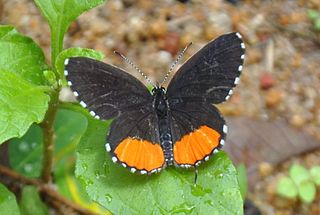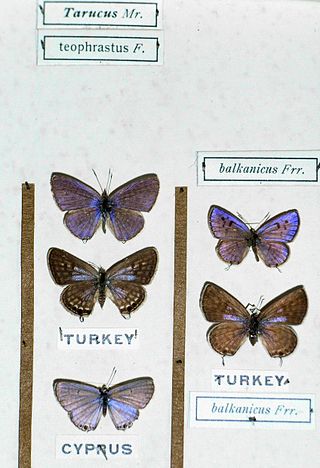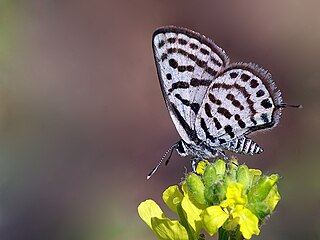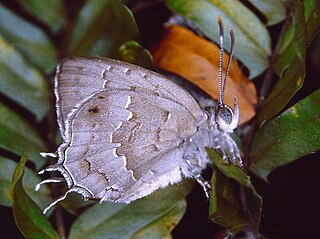
Talicada nyseus, the red Pierrot, is a small but striking butterfly found in the Indian subcontinent and South-East Asia belonging to the lycaenids, or blues family. The red Pierrots, often found perching on its larva host plant, Kalanchoe, are usually noticed due to their striking patterns and colors.

Delias eucharis, the common Jezebel, is a medium-sized pierid butterfly found in many areas of south and southeast Asia, especially in the non-arid regions of India, Bangladesh, Sri Lanka, Indonesia, Myanmar and Thailand. The common Jezebel is one of the most common of the approximately 225 described species in the genus Delias.

Leptotes plinius, the zebra blue or plumbago blue, is a species of blue butterfly (Lycaenidae) found in Sri Lanka, India to Australia. The species was first described by Johan Christian Fabricius in 1793.

Caleta caleta, the angled Pierrot, is a species of blue butterfly found in Sulawesi.

Discolampa ethion, the banded blue Pierrot, is a contrastingly marked butterfly found in South Asia that belongs to the blues or family Lycaenidae. The species was first described by John O. Westwood in 1851.

Castalius rosimon, the common Pierrot, is a small butterfly found in India that belongs to the lycaenids, or blues family.

Spalgis epius, commonly known as the apefly, is a small species of butterfly found in the Indomalayan realm that belongs to the lycaenids or blues family. It gets its name from the supposed resemblance of its pupa to the face of an ape.

Tarucus theophrastus, the common tiger blue, pointed Pierrot or African Pierrot, is a small butterfly found in the Old World tropics. It belongs to the lycaenids or blues family.

Chilades parrhasius, the small Cupid, is a small butterfly that belongs to the lycaenids or blues family. It is found in Nepal, southern Turan, southern Ghissar, Iran, Afghanistan, Pakistan, Sri Lanka, United Arab Emirates, Oman and southern, central and north-west India.

Lampides boeticus, the pea blue, or long-tailed blue, is a small butterfly that belongs to the lycaenids or gossamer-winged family.

Acytolepis puspa, the common hedge blue, is a small butterfly found in Cambodia, India, Myanmar, Thailand, Malaysia, Singapur, Yunnan, Taiwan, Sri Lanka, Philippines, Borneo and New Guinea that belongs to the lycaenids or blues family. The species was first described by Thomas Horsfield in 1828.

Prosotas aluta, the banded lineblue, is a species of blue butterfly (Lycaenidae) found in Asia. The species was first described by Herbert Druce in 1873.

Tarucus balkanicus, the Balkan Pierrot or little tiger blue, is a small butterfly that belongs to the lycaenids or blues family. It is found in Mauritania, Niger, Sudan (Khartoum), Uganda, Saudi Arabia, the United Arab Emirates, Oman, North Africa, the Balkans, western Asia, parts of central Asia and in India. The habitat consists of very arid savanna.

Arhopala bazaloides, the Tamil oakblue, is a species of lycaenid or blue butterfly found in Asia. The Tamil oakblue is found India in, Myanmar, Sri Lanka and Thailand.

Hypolycaena nilgirica, the Nilgiri tit, is an uncommon species of lycaenid or blue butterfly found in Asia, especially in the lowland regions to mid-hills of India and Sri Lanka.

Deudorix epijarbas, the cornelian or hairy line blue, is a species of lycaenid or blue butterfly found in south and southeast Asia from India to Fiji, including the Philippines, and also the tropical coast of Queensland in Australia. The species was first described by Frederic Moore in 1857.

Horaga is a genus of butterflies in the family Lycaenidae which John Nevill Eliot, 1973, places in the tribe Horagini of the subfamily Theclinae. The wings are blue, purple or brown above, with broad black costal and distal margins and usually a white discal spot on the forewing. The female is dingier than the male. The underside is ochreous, or ochreous brown, with a dark postdiscal line on both wings outwardly edged with white, this edging forming a broad white band not continued much above vein 6, on the forewing, but narrower and outwardly diffuse on the hindwing. The hindwing bears filamentous tails at veins 1b, 1 and 3 and, beneath. The pattern of H. araotina is aberrant.

Rathinda is a butterfly genus in the family Lycaenidae. It consists of a single species, Rathinda amor, the monkey puzzle, found in Sri Lanka and India.

Surendra vivarna, the acacia blue, is a species of lycaenid or hairstreak butterfly found in Sri Lanka, India and the Indonesian islands as far as Sulawesi.

Nacaduba cyanea, the tailed green-banded line-blue, is a species of butterfly in the family Lycaenidae, and formerly considered a member of the genus Danis. It is found in the Indonesia, Papua New Guinea, the Solomon Islands and Australia (Queensland).




















